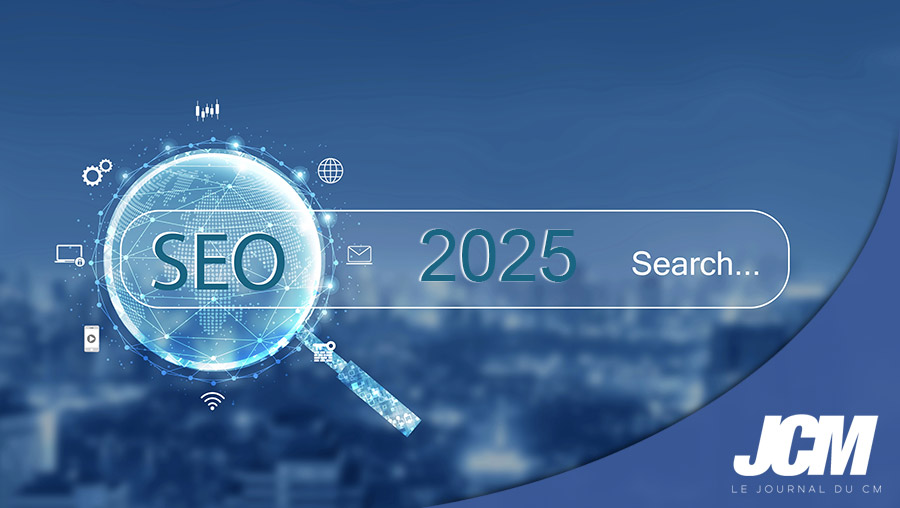SEO, or natural referencing, is always an essential lever in 2025 for any business wishing to work its visibility on the web.
Facing Google algorithms who keep evolving, it becomes essential to Master the fundamentals of SEO While adapting to new practices with AI in particular.
Here are the major points to master and/or know around SEO and a FAQ SEO of 10 questions/answers.
What is SEO?
Above all and as a reminder, the SEO means “Search Engine Optimization” and aimsOptimization for search engines. It brings together all the techniques to position a website and its pages in the first natural results of Google mainly and other engines.
Unlike the SEA (Search Engine Advertising), it is not based on the purchase of advertising spaces but on the content written for the website. Thus a good SEO allows you to attract qualified, sustainable traffic and without depending on paid advertising.
It is a substantive work that requires time, to be regular and all with a good knowledge of the needs and expectations of Internet users.
Why is SEO still essential in 2025?
With the rise of generative AI and responses enriched on Google (optimized extracts, People Also Ask, etc.), the first results are more than ever those to be prized by creators of editorial content.
Do not be visible on Google's first page of results is often associated with being invisible. SEO is still the most profitable long -term lever for generate leadsincrease sales or simply improve the image and notoriety of a business.
It is also a strategic lever for any structure that wishes to control its image and online presence. It is also important to comply with Google trends and rules without neglecting the user. So we can evoke the criteria EEAT Google aimed at Create content based on customer experience With real expertise on the subjects covered.
The 3 pillars of the SEO
1. SEO on-site-The contents : relevant, original, well structured and regularly updated content is the basis of any good SEO. He must perfectly respond to the research intentions of Internet users.
2. Seo off-site-popularity : it is mainly measured by les backlinksthat is to say the incoming links from other quality websites. The more a site is cited, the more it will be considered an authority in its field.
3. SEO Technique – Technique : site performance (speed, mobile accessibility, HTML structure, site plan, etc.) directly influences its indexing by robots.
In 2025 SEO must be seen as a large ecosystem where social networks, AI and all levers allowing to work on its authority, are to be considered in its strategy.
How to choose your keywords?
Keyword search There remains a major step in SEO. We must mainly be based on these points:
- Research intentions (informational, commercial, navigation, etc.),
- The monthly research volume,
- Competitors,
- Relevance in relation to offer or content.
Thus tools like Google Keyword Planner, Semrush or Ubersuggest will allow you to detect The most strategic requests. It is also necessary consider which is less competitive but often more qualified due to more specific requests.
Optimizing its content for Google
On-page optimization or SEO on-site remains an essential pillar of SEO. Some good practices:
- A unique and descriptive title tag,
- A meta-description that encourages the click even if Google changes it regularly,
- A well-structured HN markup with an H1 tag for the title and H2, H3 beacons for subtitles.
- An internal relevant network to strengthen SEO.
- Major keywords that brew the lexical and semantic field.
- Light images in weight with well informed Alt tags.
The content must also be also airy and simple to read, with good quality of layout, paragraphs that approach the protruding points and a style adapted to the targeted audience.
The importance of the user experience (UX)
Since the establishment of Core Web VitalsGoogle attaches greater importance to the navigation experience. Especially with regard to the following points:
- Loading times that must be quick,
- Quick access to useful information,
- Intuitive and responsive navigation,
- A site suitable for mobile navigation,
- A secure site, etc.
A good user experience will promote SEO because it will potentially decrease The rebound rate and will increase the time spent on the site (duration of sessions).
Some essential SEO tools in 2025
SEO tools are essential to save time, regularly analyze your positions, search for keywords and SEO opportunities and other potential improvements. Here are some major tools:
- Google Search Console : analyze the performance of your site on Google
- Google Analytics 4 : follow the behavior of visitors
- SEMrush / Ahrefs / Ubersuggest : follow your positions, backlinks and to make technical audits
- Screaming Frog : allows you to crawle a site and detect any technical problems
- Yoast SEO / Rank Math : allows you to improve and optimize content specifically on WordPress
Do you have to have a blog to do SEO?
Having a blog or site with a tab for content is highly recommended. It makes it possible to highlight the subjects linked to your field of activity, to answer the frequent questions of its target and to position yourself on various requests.
It is also an excellent tool for working its internal mesh and generating natural backlinks which can also be a lever for monetization, especially for those who go Live from a blog.
The role of netlinking in a SEO strategy
Netlinking (or Link Building) is to obtain quality incoming links from other websites. These links strengthen the credibility of your site in Google's eyes. Be careful to avoid questionable practices (links purchased, questionable directories, etc.). The best is to obtain backlinks naturally, thanks to quality content.
Some SEO errors to avoid absolutely
- Duplicate content on several pages (Duplicate Content)
- Neglect the tags for the titraille (HN tags)
- Neglect users on mobile (mobile-first index)
- Suroptimization of keywords which has been completely over for years.
- Neglect the user in favor of Google bots and/or SEO. The user must stay in the center.
So Seo in 2025 There remains as much a question of technique as of common sense, where AI also has a major role to play in the results delivered.
FAQ on SEO (natural referencing)
Here are the 10 major questions related to research intentions around SEO.
1. What is SEO?
The SEO, or Search Engine Optimization, designates all techniques aimed at improving the visibility of a website and its pages in the organic results of search engines like Google. The objective sought by all web players, aims to position yourself in the first three results at least and on relevant keywords allowingattract qualified traffic.
2. Why is SEO important for a website?
The SEO is essential because it allows you to generate qualified traffic “free” over the long term. Unlike paid advertising (SEA), SEO is based on substantive work and offers lasting visibility. It is often the basis of a good digital marketing strategy.
3. What is the difference between SEO and SEA?
SEO is a natural referencing based on contenttechnique and popularity. The SEA (Search Engine Advertising) is based on paid advertising campaigns via Google Ads mainly. The SEO takes more time but is more sustainable, while the SEA offers immediate, but temporary results.
4. How long does it take to see the results of the SEO?
The first effects of a SEO strategy generally appear after several months, but it all depends on the competition on the targeted keywords, the quality of the content, of The technical health of the site and the netlinking strategy implemented. It must be tackled as an investment in the medium and long term.
5. What are the Pillars of SEO?
SEO is based on 3 main pillars :
- The contents : relevant, well structured, responding to research intentions.
- Technique : loading speed, HTML structure, mobile friendly, etc.
- The popularity : mainly based on incoming links (backlinks) from trusted sites.
6. How to choose the right keywords for SEO?
You always have to put yourself in the place of a surfer carrying out a research: what keywords or expressions would he grasp on Google? Use tools like Google Keyword Planner, Ubersuggest or Semrush to analyze research volumes and competition.
Also think of the so -called long -trained expressions, often less competitive but highly qualified. These are expressions bringing together several words/terms to obtain a response adapted to a specific request.
7. How do I know if my site is well referenced?
Several tools make it possible to analyze the positioning of a site on Google: Google Search Console, Semrush, Ahrefs or Ubersuggest. They also monitor clicks, prints and click rates (CTR) to understand what works or not.
8. Is SEO really free?
Organic traffic does not require buying advertising, but it does not make it say that it is free in the literal sense of the term. The SEO takes time, human resources with skills as well as paid tools.
If you go through a SEO consultant or agency, this will obviously have a cost. We therefore speak of a free referencing, but not without effort or investment. We are talking about free as opposed to the paying SEO.
9. Can we do SEO without blog?
Yes, but it's much more difficult. A blog allows you to regularly create optimized content, position yourself on many requests and attract qualified traffic. It also strengthens the authority of the site in the case of a content tab. A site without content is unlikely to position itself well especially when the brand or the company is not known.
10. What are the most frequent errors in SEO?
Among the most common errors in SEO, we find:
- Keyword jam or overoptimization,
- Neglecting the user experience such as loading times, intuitive navigation, etc.,
- Title and Meta-Description tags that are not optimized,
- Duplicated content,
- Do not have a links strategy whether internal or external,
 mes emplois préférés décoration de maison
mes emplois préférés décoration de maison





